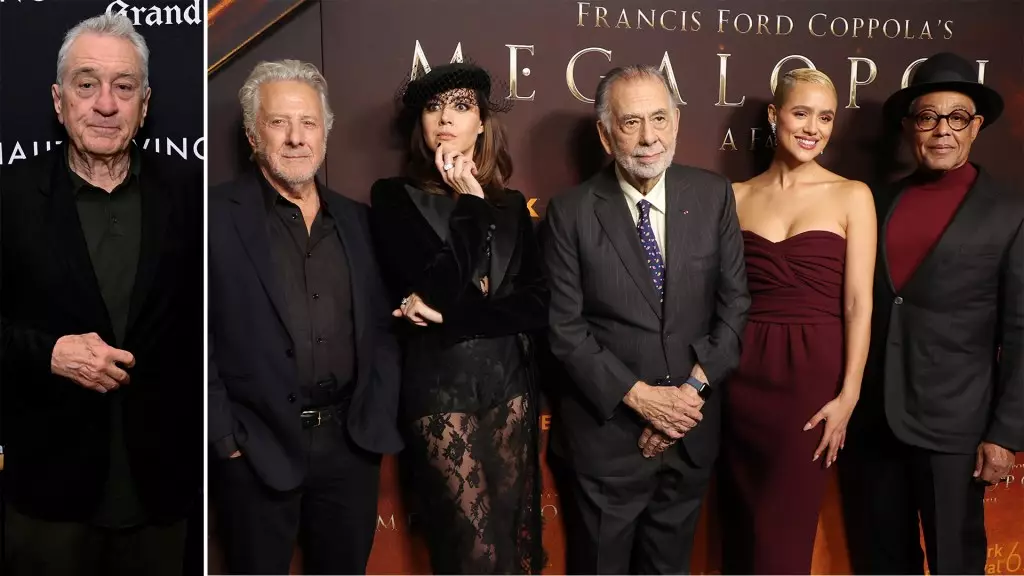In a world where the lines between entertainment and political discourse become increasingly blurred, Robert De Niro delivered a standout moment at the recent premiere of Francis Ford Coppola’s latest film, “Megalopolis.” His deadpan delivery while discussing a hypothetical scenario – Donald Trump directing a film – not only elicited laughter from the audience but also provided a critical commentary on the current political landscape. The interaction unfolded at the New York Film Festival’s special Imax event, where De Niro, Coppola, and fellow filmmaker Spike Lee engaged in a Q&A session that quickly turned from film to politics.
“Just imagine Donald Trump directing this film,” De Niro quipped, weaving a thread of humor into a serious critique. His assertion that Trump “could not hold anything together” went beyond mere jest; it was a poignant observation about the chaotic state of contemporary governance. De Niro’s abilities as an actor are complemented by his courage to influence public sentiment, which he demonstrated readily in his astute analysis of American politics. The statement served as a launching pad for deeper discussions around the thematic parallels between “Megalopolis” and the socio-political climate of today.
De Niro’s comments reflect the anxiety felt by many over the direction the country may take, especially in an election year rife with uncertainty. His perspective—echoed by Lee during the discussion—illustrates a shared concern among artists who perceive their role not just as entertainers but as advocates for civic involvement. “Everybody has to get out there and vote,” he emphasized, a sentiment that rings particularly true as political divisiveness continues to permeate the societal fabric.
Spike Lee, with his characteristic fervor, joined De Niro in this clarion call for political engagement. His slogan, “forward not backward,” reiterates the urgency of the moment, urging citizens to register and participate in the electoral process. By drawing parallels to the world of sports, Lee reminded attendees that the game is not over until the final whistle has blown. This sports metaphor illustrates the ongoing struggle for democracy where taking one’s foot off the pedal could be the difference between victory and defeat.
The lively exchange among these cinematic titans underscores the idea that significant cultural narratives often intersect with the political realm. Their shared mission to encourage spectator involvement in democracy mirrors themes present in their respective works: the importance of community, responsibility, and the impact of choices.
Adding another layer to the discourse, Coppola articulated a notable point: the idea that film sets can be microcosms of broader society, where disagreements exist yet humanity prevails. It’s an optimistic vision that paves the way for collaborative creativity without necessitating ideological conformity. Unnamed in the discussion were several actors, such as Jon Voight, who hold opposing political views yet contribute to the artistic community. This acknowledgment invites conversation about the complex relationships that flourish within creative spaces.
Coppola’s “Megalopolis,” a project he has nurtured for over two decades, stands as a symbol of passionate artistic expression. With a hefty budget of $120 million and a star-studded cast including Adam Driver, Nathalie Emmanuel, and Shia LaBeouf, the film embodies the ambition prevalent in modern cinema. However, the reaction it garnered at Cannes was a mix of admiration and criticism, highlighting the polarized nature of contemporary film critique, much like the political sphere it often mirrors.
The dialogue at the Q&A underscores a wider cultural narrative that explores the intersection of art and social commentary. With artists like De Niro and Lee stepping forward as vocal advocates, there exists an undeniable responsibility felt by those in the public eye to not only entertain but educate and mobilize audiences. The film industry, once primarily a source of escapism, is now sizzling with vigor as artists seek to forge meaningful discussions around pressing issues.
Robert De Niro’s humorous yet incisive remarks at the premiere of “Megalopolis” acted as a lens through which audiences could view the broader societal implications of their work. By marrying the realms of cinema and politics, these filmmakers have sparked a conversation that extends beyond the silver screen, ultimately engaging the electorate and urging every citizen to participate in shaping the future. Thus, as we approach crucial voting periods, the challenge becomes clear: will we heed this rallying call and turn our laughter into action?


Leave a Reply